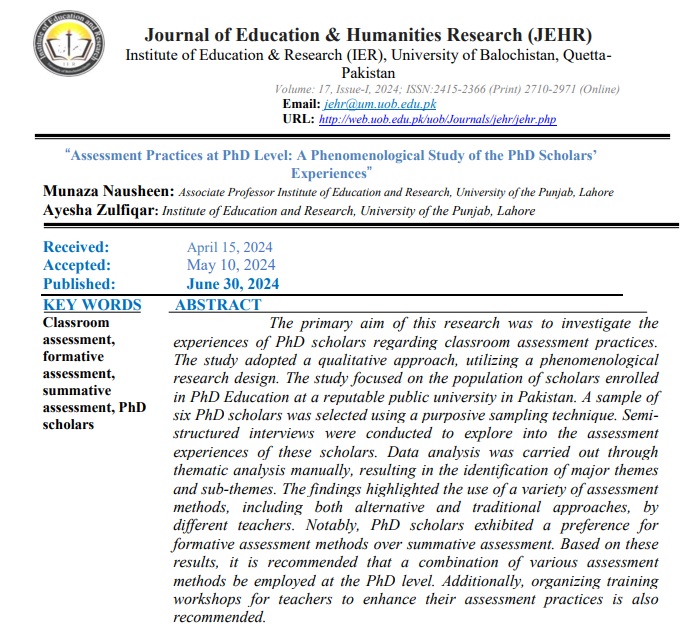Assessment Practices at PhD Level: A Phenomenological Study of the PhD Scholars’ Experiences
Keywords:
Classroom assessment, formative assessment, summative assessment, PhD scholarsAbstract
The primary aim of this research was to investigate the experiences of PhD scholars regarding classroom assessment practices. The study adopted a qualitative approach, utilizing a phenomenological research design. The study focused on the population of scholars enrolled in PhD Education at a reputable public university in Pakistan. A sample of six PhD scholars was selected using a purposive sampling technique. Semi-structured interviews were conducted to explore into the assessment experiences of these scholars. Data analysis was carried out through thematic analysis manually, resulting in the identification of major themes and sub-themes. The findings highlighted the use of a variety of assessment methods, including both alternative and traditional approaches, by different teachers. Notably, PhD scholars exhibited a preference for formative assessment methods over summative assessment. Based on these results, it is recommended that a combination of various assessment methods be employed at the PhD level. Additionally, organizing training workshops for teachers to enhance their assessment practices is also recommended.
References
Allen, D., Ort, S. W., & Schmidt, J. (2009). Supporting classroom assessment practice: Lessons from a small high school. Theory into Practice, 48, 72-80
Amua-Sekyi, T. E. (2016). Assessment, Student learning and classroom practice: a review. Journal of Education and Practice, 7(21), 1-6
Awoniyi, F. C. & Fletcher, J. A. (2014). The relationship between senior high school mathematics teacher characteristics and assessment practices. Journal of Educational Development and Practice, 4, 21-36.
Black, P., & William, D. (1998). Assessment and classroom learning. Assessment in Education: Principles, Policy and Practice, 5(1), 1-73.
Black, P., Harrison, C., Lee, C., Marshall, B., & William, D. (2003). Assessment for learning: Putting it into practice. Buckingham, UK: Open University Press
Boud, D., & Falchikov, N. (2007). Rethinking assessment in higher education: Learning for the long term. New York: Routledge.
Chappuis, S., & Stiggins, R. J. (2004). Classroom assessment for learning. Educational Leadership, 60, 40-43.
Delandshere, G. (2002). Assessment as inquiry. Teachers' College Record, 104(7), 1461–1484.
Dhindsa, H., Omar, K., & Waldrip, B. (2007). Upper secondary bruneian science students' perceptions of assessment. International Journal of Science Education, 29(10), 1281-1280.
Dochy, F., Segers, M., Gijbels, D., & Struyven, K. (2007). Assessment engineering: Breaking down barriers between teaching, and learning and assessment. In D. Boud & N. Falchikov (Eds.), Rethinking assessment in higher education: Learning for the longer term (pp. 87-100). New York: Routledge
Firestone, W. A., & Mayrowetz, D. (2000). Rethinking “high stakes”: Lessons from the United States and England and Wales. Teacher College Record, 102(4), 724-749.
Fletcher, R., Meyer, L., Anderson, H., Johnston, P., & Rees, M. (2012). Faculty and students conceptions of assessment in higher education. Higher Education, 64(1), 119- 133. http://doi.10.1007/s10734-011-9484-1.
Glatthorn, A. & Joyner, R. (2005). Writing the winning thesis or dissertation: A step-by step guide. Thousand Oaks, CA: Corwin Press
Goodwin, A. L. (2000). Honoring ways of knowing. Equity resource center digest on education assessment. Newton, MA: Women’s Educational Equity Act Resource Center.
Heritage, M. (2007). Formative assessment: What do teachers need to know and do? Phi Delta Kappa, 89(2), 140-145
Herrera, S.G., Murry, K. G., & Cabral, R.M. (2007). Assessment accommodations for classroom teachers of culturally and linguistically diverse students. Boston, MA: Pearson Education Inc.
Klinger, D.A., & Luce-Kapler, R. (2007). Walking in their shoes: Students' perceptions of large-scale high stakes testing. The Canadian Journal of Program Evaluation, 22(3), 29-52.
Linn, R. L., & Miller, M. D. (2005). Measurement and assessment in teaching. (9th ed.) Upper Saddle River, NJ: Prentice Hall.
Madrigal, D., & Mcclain, B. (2012). Strengths and weakness of quantitative and qualitative research. Insight from Research. http://www.uxmatters.com/mt/archives/2012/09/.
Merriam, S. (1998). Qualitative research and case study applications in education. San Franscisco: Jossey-Bass.
Meyers, N., & Nulty, D. (2009). How to use (five) curriculum design principles to align authentic learning environments, assessment, students’ approaches to thinking and learning outcomes. Assessment & Evaluation in Higher Education, 34(5), 565-577. http://doi.10.1111/j.1745-3992.2003.tb00142.x
Mussawy, J. A, S. (2009). Assessment practices: Student’s and teachers’ perceptions of classroom assessment (2009). Master's Capstone Projects. htps://scholarworks.umass.edu/cie_capstones/9
Nicol, D. (2009). Assessment for learner self-regulation: Enhancing achievement in the first year using technologies. Assessment and Evaluation in Higher Education, 34(3), 335-352.
Padilla-Diaz, M. (2015). Phenomenology in educational qualitative research: Philosophy as science or philosophical science?. International Journal of Educational Excellence, 1(2), 101-110.
Pereira, D., Flores, M., & Niklasson, L. (2015). Assessment revisited: A review of research in assessment and evaluation in higher education. Assessment & Evaluation in Higher Education, 30(2), 65-76. http://doi.10.1080/02602938.2015.1055233.
Pereira. R. D., & Flores. A. M. (2016). Conceptions and practices of assessment in higher education: A study of portuguese university teachers. Revista Iberoamericana de Evaluación Educativa, 9 (1), 9-29. http://doi.10.15366/riee2016.9.1.001.
Pryor, J., & Crossouard, B. (2008). A socio-cultural theorization of formative assessment. Oxford Review of Education, 34(1), 1-20.
Schram, T. H. (2005). Conceptualizing and proposing qualitative research. Upper Saddle River, NJ: Merrill Prentice Hall.
Scriven, M. (1967). The methodology of evaluation. Washington, DC: American Educational Research Association.
Simms, M., & George, B. (2014). Approaching assessment from a learning perspective: Elevating assessment beyond technique. Educational Assessment Evaluation and Accountability, 26(1), 95- 104. http://doi.10.1007/s11092-013-91768
Singh, S. K G., Lebar, O., Kepol, N., Rahman, A. F., Mukhtar, M. A. K. (2017). An observation of classroom assessment practices among lecturers in selected Malaysian higher learning institutions. Malaysian Journal of Learning and Instruction, 14 (1), 23-61.3
Watering, G., Gijbels, D., Dochy, F., & Rijt, J. (2008). Students’ assessment preferences, perceptions of assessment and their relationships to study results. Higher Education, 56(6), 645-658. http://doi.10.1007/s10734-008-9116-6
Wiggins, G., & Mctighe, J. (2007). Schooling by design: Mission, action and achievement. Alexandria, VA: Association for Supervision and Curriculum Development




